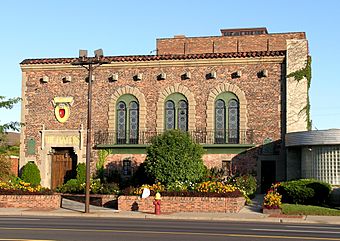The Players (Detroit, Michigan) facts for kids
|
The Players
|
|
 |
|
| Location | 3321 East Jefferson Avenue Detroit, Michigan |
|---|---|
| Built | 1925 |
| Architect | William E. Kapp; Smith, Hinchman & Grylls |
| Architectural style | Florentine Renaissance, Arts and Crafts, Art Deco (murals) |
| NRHP reference No. | 87000920 |
Quick facts for kids Significant dates |
|
| Added to NRHP | June 12, 1987 |
The Players is a special clubhouse and theater located at 3321 East Jefferson Avenue in Detroit, Michigan. It is a historic building where people have enjoyed plays and social events for many years. It was recognized as a Michigan State Historic Site in 1985. Later, it was added to the National Register of Historic Places in 1987.
Contents
History of The Players Club
The Players Club of Detroit began in 1911. It was started by a group of local Detroit businessmen. Their goal was to encourage amateur theater, which means plays put on by people who act for fun, not as a job. From the very beginning, it was a club only for men.
For the first 15 years, the club did not have its own building. They performed their plays in different places each month. These places included the Detroit Athletic Club and the University Club. Many important people from Detroit were members of The Players. These included Henry Bourne Joy and James Couzens.
The club was very successful and popular for many years. However, in the 1970s, fewer people joined. The club became popular again in the 1990s. By 2005, it had 174 members.
Architecture of the Clubhouse
In 1925, a member of The Players Club named William E. Kapp designed a building. This building was made to be the club's permanent home. Kapp worked for a company called Smith, Hinchman & Grylls. The building cost about $75,000 to build.
The clubhouse has two stories and is very decorated. It was built using cinder blocks, which was a new material at the time. The outside of the club looks like a Florentine Renaissance style building. It has a tile roof. The front of the building has a special archway with a metal balcony. Ten sculpted gargoyles, which are decorative stone figures, were made by Corrado Parducci for the front. The name "The Players" is carved in stone below the west entrance.
Inside, the building has a tall stage that is four stories high. There is also a kitchen, dressing rooms for actors, and storage areas. A formal meeting room is located on the upper floor.
The inside of the building is famous for its Art Deco murals. Murals are large paintings on walls. Six murals in the auditorium were painted by Paul Honoré. They show a group of traveling performers. Eight smaller banners in the building show different skills needed to put on a play.
Plays and Performances
Members of The Players put on three one-act plays at each event, which they call a "Frolic." These Frolics happen on the first Saturday evening of the month, from October through April. There are a few exceptions to this schedule.
In November, instead of three one-act plays, a full three-act play is performed. In January, the Frolic is replaced with a special event to raise money for the club. All the jobs for the plays are done by members. This includes acting, directing, making costumes, and building sets. Following an old theater tradition, all the roles on stage are played by men.
Historic Site Information
The clubhouse is built over a part of Parents Creek. This creek is famous for a historical event. On July 31, 1763, the Battle of Bloody Run happened near this spot. It was a battle between Chief Pontiac and British forces. The creek was said to have run red with blood during this battle. A historical marker from the state of Michigan is placed in front of the building. It tells about this important battle.
See also
- Players (disambiguation)
 | William L. Dawson |
 | W. E. B. Du Bois |
 | Harry Belafonte |



